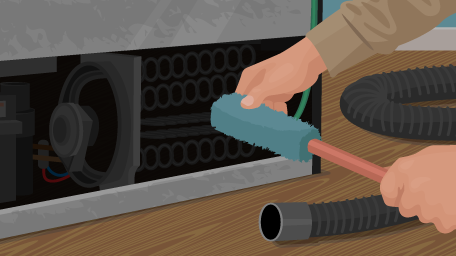
The Ultimate Guide to Home Air Conditioning
Temperatures have been hitting record highs already this summer, so if you have been researching air conditioners, we don’t blame you! There are many options out there, so finding the right solution for your home can be a tough decision. The size and shape of your home along with your budget are just a couple of the factors to take into consideration. In this article, we’re going to look at four different types of air conditioning systems, and the advantages and disadvantages of each.
When you are shopping around for a new air conditioner, you need to look at more than just the purchase price. When making our comparisons, we thought about these five factors:
- Energy efficiency
- Ease of installation
- Cost (both upfront and operating)
- Maintenance requirements
- Noise while operating

Portable
A portable air conditioner is easy to set up, can be used with most types of windows, and is generally affordable to purchase. Another perk is in the name: these units are portable and many are on caster wheels so they can be moved from room to room. For example, maybe you work from home so you can set up the AC in your office during the day, then move it back to the bedroom at night. However, these units are also the least efficient and the noisiest. They are also quite heavy (50 – 80 lbs.), so if you’re trying to roll it over carpet or stairs it may be difficult to maneuver. When it is no longer cooling season, you will also need additional storage space for the unit. Maintenance is easier, as the unit sits on your floor instead of hanging out the window, and it’s important to keep all filters and coils clean and free of debris. These units typically have a shorter lifespan (5 – 10 years) even with regular maintenance. Portable ACs will absolutely help to keep you cool, and we'd recommend this type if you’re renting and unable to install a window or wall unit.

Window
A window AC unit is another temporary option, but with many more advantages over the portable units. Similarly, they have lower upfront costs, are easy to install, and easy to maintain. However, compared to a portable unit, they are much more energy efficient (many are Energy Star rated), have a longer lifespan (10 – 20 years), and are a bit quieter since a portion of the unit is outside the house. The disadvantage to this style is that you will need to install and remove the unit with the seasons, and have a place to store it in the winter. They also don’t work with every type of window, like casement windows. They tend to work best in double-hung, however verticle models are available for slider-style windows. Larger units can be more difficult to install due to their weight, so keep this in mind if your room has a lot of square footage to cool.

Ductless Mini-Split
Ductless mini-splits are a great option if your home does not have ductwork already, and you want a more permanent option than a window or portable unit. They generally have a few different operating modes including cooling, heating, dehumidify, and just a fan. These types of units have an outdoor condenser/compressor and the indoor evaporator/head of the unit. Multiple heads can be attached to the one outdoor condenser, so you can have more than one room or zone being cooled. For example, you could have one head in the main living area and a second in the primary bedroom. Since you don’t need to worry about ducting, they can be installed in most rooms and are a great option for large and open concept spaces. These units are very quiet and efficient while operating. They have a lifespan of approximately 20 years with regular maintenance.
However, due to their height on the wall, maintenance may be more difficult. The outdoor condenser also needs to be routinely cleaned to keep it free of debris. The install and maintenance of these units may need to be done by a professional if you’re not comfortable drilling through your home’s exterior yourself. The upfront cost can be quite expensive, but some utility companies are offering rebates, discounts, or financing plans to have these installed. As these are also considered a room air conditioner, they won’t provide you with whole-house cooling. They are also a very visible and permanent fixture, as they are attached to the wall up near the ceiling.

Ducted / Central Air / HVAC
This is the ultimate solution for whole-home cooling, but the most expensive of the options. If your house already has a ducted or forced air system in place, swapping an old oil or gas furnace can be a great choice. The system can also be controlled with a programmable or smart thermostat, which will help it to run the most efficiently. Of all the air conditioning options we discussed, this will be the quietest. Being able to keep your entire home at a comfortable temperature year-round is definitely the major advantage to this type of system.
If your home doesn’t already have ductwork in place, installing an HVAC or ducted heat pump probably isn’t the best option due to the cost and renovations needed. HVAC maintenance may need to be done by a professional, but it can also be a DIY project . The lifespan for this version also isn’t the longest of the options, it’s estimated at about 15 years.

General Maintenance Tips
A well-maintained air conditioner is going to run the most efficiently, which in turn helps to keep your costs down. It will also lead to a longer lifespan for the equipment, which will save you the cost of replacing it frequently! Since you are breathing in the air that the unit is blowing out, you definitely want to keep things clean. In humid climates, it’s easy for mold to grow if you’re not keeping up with maintenance. Some common areas you will want to inspect regularly include the filters, condenser and evaporator coils, the lines, ducts, and drains.
If you need any replacement parts for your AC unit, we have you covered! Simply search for your model number on PartSelect.com to find OEM parts specifically for your unit. Be sure to follow along with our YouTube channel for more tips and tricks for your home appliances.




























